Best Crypto Exchanges in Argentina
.webp)
Summary: Argentina provides investors with a variety of reputable local platforms and trusted international crypto exchanges. These platforms adhere strictly to the regulatory frameworks set by Argentina's Financial Information Unit (UIF) and the National Securities Commission (CNV).
Here are the six best cryptocurrency exchanges supporting Argentine peso (ARS) deposits:
Bybit is Argentina's top cryptocurrency platform due to its user-friendly interface, extensive range of digital assets, competitive fees, and adherence to regulatory standards.
Available Markets
2,000+ Cryptocurrencies
Fees
0.1% Spot Trading Fees
ARS Deposit Methods
Bank Transfer, Cards, Mercado Pago
Top Crypto Trading Platforms in Argentina
Argentina is home to several trusted cryptocurrency exchanges regulated by the Financial Information Unit (UIF) and the Comisión Nacional de Valores (CNV). We've assembled details about Argentina’s top crypto platforms, focusing on key points such as ARS deposit options, transaction fees, platform security, supported cryptocurrencies, and standout trading features.
1. Bybit
Bybit is the best crypto exchange in Argentina, favored by experienced traders for its cutting-edge features and reliable user experience. Since its launch in 2018, it has grown to serve over 74 million users and daily trading volumes exceeding $35 billion across both spot and futures markets.
The exchange provides extensive trading services, from spot trading to high-leverage perpetual futures contracts offering up to 200x leverage. Unique tools like TradeGPT offer traders AI-powered analytics, and copy trading allows users to replicate trades from profitable traders worldwide.
Products like "Bybit Earn" provide flexible staking and yield opportunities, while the "Bybit Card" rewards users with up to 10% cashback and exclusive VIP perks. Committed to transparency, Bybit regularly updates its proof-of-reserves, reassuring investors that assets are securely backed at all times.
Platform Highlights:
- Fees: Low spot fees from just 0.1%; competitive futures fees.
- Supported Assets: Over 2,000 cryptocurrencies.
- Regulation & Licensing: Holds a VASP license from UIF.
- ARS Deposit Methods: Credit cards, debit cards, MercadoPago, Lemon Cash, and other digital wallets.
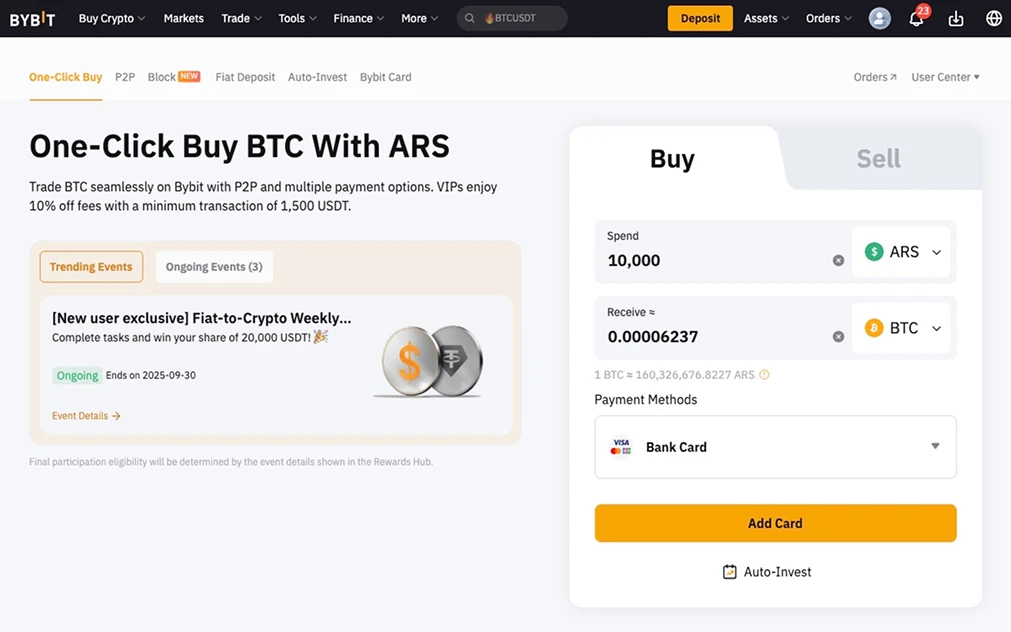
2. Binance
Binance is a highly regulated and trusted platform, offering extensive features suited to all trading styles. Established in 2017, it has grown into the largest cryptocurrency exchange globally, now serving over 250 million users and offering a multilingual interface accessible in Spanish.
Argentine traders benefit from Binance’s diverse trading services, including spot markets, advanced futures contracts, options trading, and an OTC desk. It also offers automated trading tools through trading bots, enabling users to deploy grid trading strategies, arbitrage bots, and rebalancing algorithms.
Its Auto-Invest feature further allows users to accumulate cryptocurrencies using dollar-cost averaging. Binance Earn offers popular staking opportunities and yield products, while Launchpad and Launchpool platforms allow users to participate in new token launches and receive airdrops.
Platform Highlights:
- Fees: Low trading fees from 0.1%, further reduced when paying with BNB.
- Supported Assets: Over 350 cryptocurrencies.
- Regulation & Licensing: Binance Services Latinoamérica S.A. de C.V. is a VASP registered under number 76 on September 11, 2024, with the CNV.
- ARS Deposit Methods: Bank transfers (CBU/CVU), debit cards, credit cards, MercadoPago.
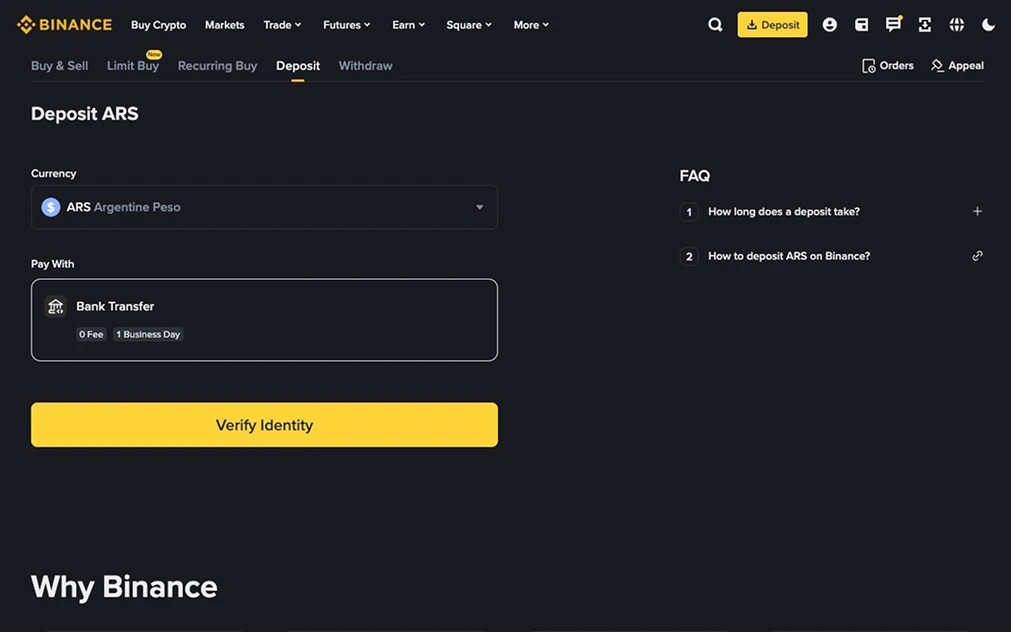
3. MEXC
MEXC has gained popularity among crypto traders due to its exceptional leverage and competitive trading conditions. Argentine traders favor MEXC particularly for its futures markets, which uniquely offer leverage up to 500x, allowing experienced traders to maximize potential returns.
The exchange offers 1,300 futures pairs, including USDT-M, COIN-M, and USDC-M perpetual contracts. Additionally, MEXC regularly hosts engaging events and competitions like Futures M-Day and trading contests, rewarding active Argentine traders with generous prizes and bonuses.
Beyond futures trading, MEXC provides a user-friendly spot market, easy-to-use Copy Trading features, and innovative staking opportunities through MEXC Earn. Robust asset security measures, including a $100 million Guardian Fund and transparent proof-of-reserves, reinforce trader confidence.
Platform Highlights:
- Fees: Zero futures maker fees, with taker fees as low as 0.02%.
- Supported Assets: Over 2,700 cryptocurrencies.
- Regulation & Licensing: Holds a VASP license with the CNV.
- ARS Deposit Methods: Bank transfers, MercadoPago, debit/credit cards, digital wallet deposits.
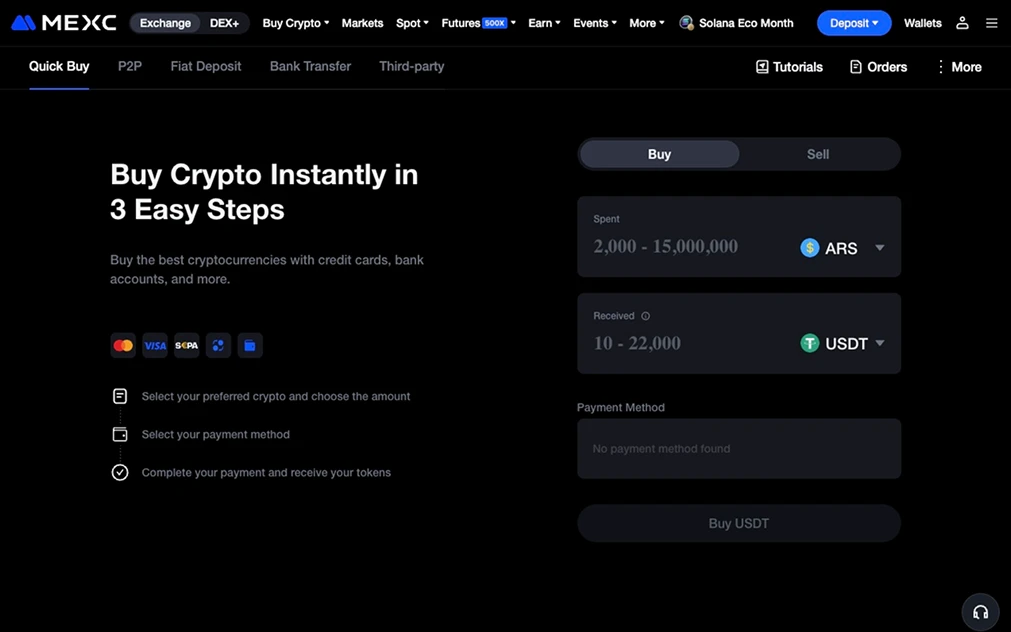
4. OKX
OKX is recognized for its extensive DeFi services, advanced trading tools, and reliable security. Since launching in 2017, OKX has grown into a global powerhouse serving 30 million users in over 180 countries, providing unmatched liquidity, ultra-fast transactions, and competitive trading fees.
Traders find OKX appealing thanks to its powerful automated trading bots. It provides intelligent, pre-built bots like Spot Grid, Futures Grid, Smart Arbitrage, and Dollar-Cost Averaging (DCA). OKX also offers advanced perpetual and expiry futures, options trading, and comprehensive API integration.
With OKX Earn, users can participate in high-quality projects through staking, borrowing, or dual investment products. The OKX Wallet further connects traders seamlessly to various DeFi applications like lending protocols and NFT marketplaces, making decentralized finance accessible and intuitive.
Platform Highlights:
- Fees: 0.08% fee for spot trading.
- Supported Assets: Over 350 cryptocurrencies.
- Regulation & Licensing: Complies with CNV regulations and is registered in Argentina.
- ARS Deposit Methods: Bank transfers, credit cards, debit cards.
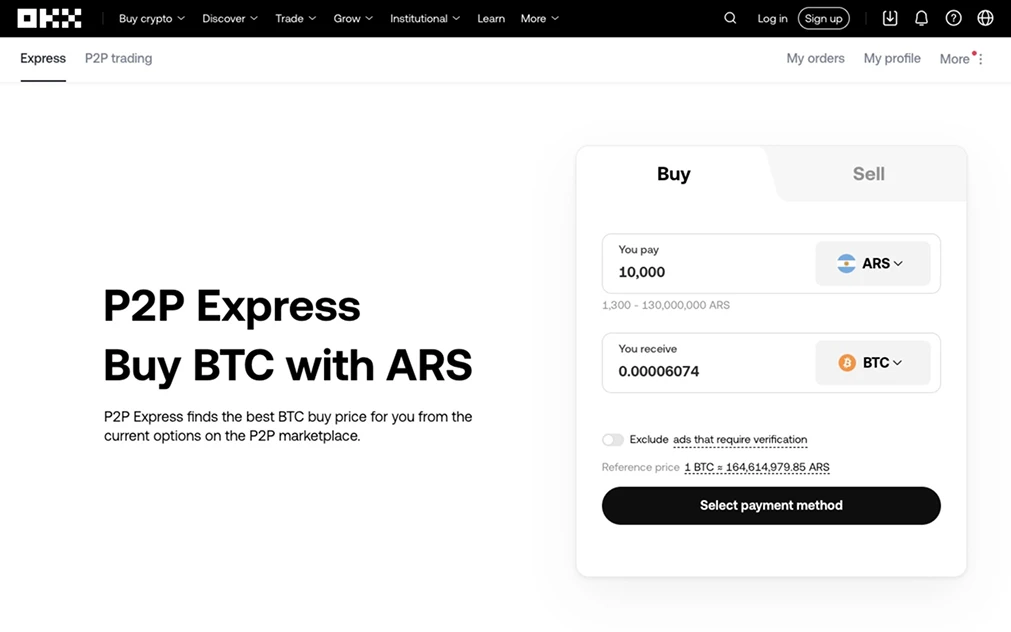
5. Coinbase
Coinbase is the go-to crypto platform for institutions, traders, and individual investors seeking reliability and compliance. Operating as the largest publicly traded crypto exchange, it is highly trusted, managing over $193 billion in secured assets and facilitating quarterly trading volumes exceeding $154 billion.
Institutions value Coinbase Advanced, which provides powerful trading solutions such as spot trading with over 550 pairs, perpetual futures, derivatives, and advanced API integration. Coinbase Advanced comes equipped with TradingView charts, technical indicators, and custom watchlists.
Traders can earn up to 15% APY through staking cryptocurrencies. With Coinbase One membership, traders benefit from zero trading fees, exclusive customer support, and boosted staking rewards. Security remains unmatched with stringent asset protections, including full 1:1 asset backing.
Platform Highlights:
- Fees: Spot trading fees start from 0.2%.
- Supported Assets: Over 210 cryptocurrencies.
- Regulation & Licensing: Registered as a VASP with Argentina's CNV.
- ARS Deposit Methods: Credit cards, debit cards.
.webp)
6. Uphold
Uphold is becoming the preferred crypto platform for Argentine traders looking to easily trade cryptocurrencies, earn attractive staking rewards, and spend crypto globally. With its one-step trading feature, it lets you instantly trade across cryptocurrencies, fiat currencies, and precious metals in a single click.
Investors seeking passive income opportunities will find Uphold particularly attractive, offering staking rewards of up to 16.1% APY on popular cryptocurrencies. Rewards are credited weekly, and users can stake and unstake assets instantly, making Uphold one of the most flexible platforms available.
The Uphold Card is another key benefit, enabling Argentines to spend their crypto or traditional currency anywhere Mastercard is accepted with zero foreign transaction fees. Whether traveling abroad or shopping online, the Uphold Card provides easy transactions with highly competitive exchange rates.
- Fees: A trading fee of 1% and a spread fee of 1%.
- Supported Assets: Over 300 digital assets, 4 precious metals, and 27 fiat currencies.
- Regulation & Licensing: Regulated by the FCA and available in Argentina.
- ARS Deposit Methods: Apple Pay, Google Pay, bank transfers, credit cards, debit cards.

Is Crypto Regulated in Argentina?
Cryptocurrency regulation in Argentina remains evolving, characterized by fragmented oversight from multiple financial authorities rather than a single, unified framework. Digital assets, including Bitcoin and stablecoins like USDT, are legal to buy, sell, and hold, yet they aren't classified explicitly as legal tender.
Regulatory Bodies and Responsibilities
Argentina’s crypto landscape is overseen by several agencies, each with distinct roles:
- Unidad de Información Financiera (UIF): The UIF is Argentina’s main financial intelligence authority, responsible for AML and counter-terrorism financing measures. Crypto exchanges operating within Argentina must register as reporting entities with UIF and comply with customer identification (KYC) and reporting of suspicious transactions.
- Comisión Nacional de Valores (CNV): The CNV manages licensing and oversight of investment instruments and platforms. Although crypto assets aren't explicitly classified as securities, CNV regulates Virtual Asset Service Providers (VASPs), mandating them to register and adhere to investor protection standards and transparency measures.
- Banco Central de la República Argentina (BCRA): Argentina’s Central Bank closely monitors financial stability risks arising from crypto transactions. Although BCRA has not issued direct restrictions on individual crypto use, it prohibits traditional financial institutions like banks from directly providing crypto services or custody of digital assets.
Cryptocurrencies in Argentina are permitted for purchase, sale, and personal holdings. Argentine citizens regularly utilize stablecoins and cryptocurrencies as alternatives to the local currency (peso) due to persistent inflation and foreign exchange restrictions. Stablecoins, especially those pegged to the US dollar, have widespread popularity among Argentines.
How Is Crypto Taxed in Argentina?
Argentina treats cryptocurrency holdings as taxable assets, and anyone investing in digital currencies must navigate specific tax obligations set by the Administración Federal de Ingresos Públicos (AFIP), Argentina’s federal tax authority.
Here are the primary taxes you need to be aware of:
- Capital Gains Tax - Applied when crypto assets are sold or exchanged at a profit. The rates are 5% if the sale occurs in Argentine Pesos (ARS), domestically, without currency adjustment, or 15% if the transaction involves foreign currencies, international exchanges, or includes currency adjustments.
- Income Tax - Applies to crypto earnings such as mining rewards, staking rewards, crypto payments for goods or services, or interest from crypto lending platforms. The rates range from 5% to 35% for individuals, depending on your annual income bracket; for companies, standard corporate rates range from 25% to 35%.
- Personal Asset Tax - Crypto holdings must be reported as part of your annual asset declaration on December 31 each year. Rates range from 0.25% to 1.25%, depending on the total value of your declared assets.
- Value-Added Tax - Purchasing or selling cryptocurrencies directly is not subject to VAT. However, using crypto to buy goods or services within Argentina triggers the standard 21% VAT rate on that purchase, assuming the seller is VAT-registered.
Navigating cryptocurrency taxation in Argentina requires careful attention, meticulous record-keeping, and adherence to AFIP guidelines. By understanding these tax obligations clearly, Argentine residents can effectively manage their crypto portfolios and remain confidently compliant within the nation’s regulatory framework.
Cryptocurrency Adoption in Argentina
Cryptocurrency adoption in Argentina continues to rise rapidly, driven by ongoing economic volatility, persistent inflation, and increasing public demand for alternative financial solutions.
As of 2025, Argentina's cryptocurrency market is projected to generate approximately US$940.9 million in revenue, reflecting strong adoption despite challenging market conditions.
User adoption is also relatively high, with 22.8% of the country’s population engaging with cryptocurrencies in 2025, increasing to 23.8% by the following year. By 2026, over 11 million Argentines will be actively using cryptocurrency services. This high level of adoption places Argentina among key global crypto markets, alongside the United States, Brazil, and Germany.
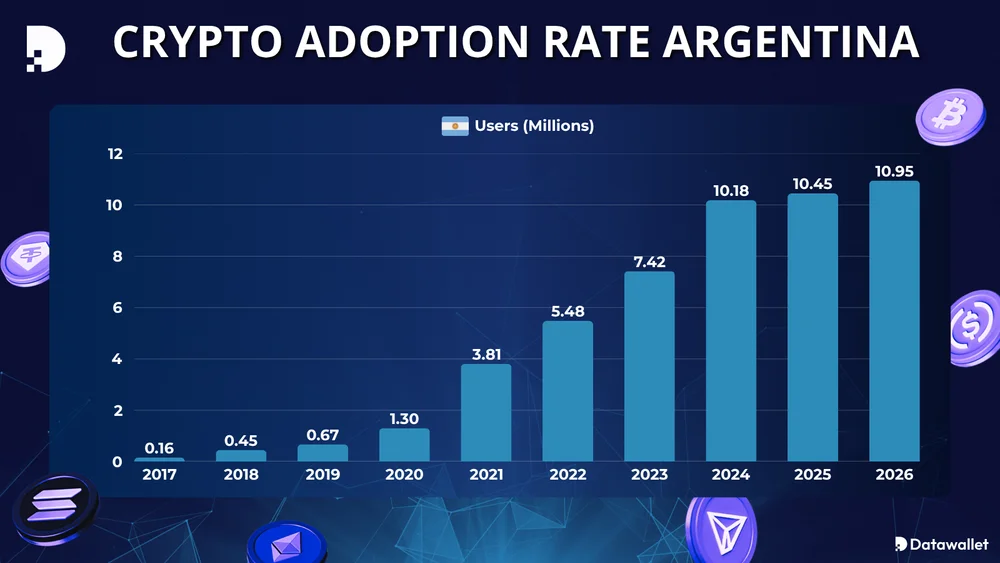
How to Buy Bitcoin in Argentina
For Argentine investors interested in buying Bitcoin (BTC), it’s crucial to use trusted cryptocurrency exchanges that comply with CNV and UIF regulations. Here’s a straightforward guide on how to purchase Bitcoin in Argentina:
- Select a Crypto Exchange: Choose a reputable exchange registered with Argentina’s CNV, such as Binance or Bybit.
- Create Account: Create an account on your chosen platform and complete the Know Your Customer (KYC) procedure. Typically, you'll need government-issued ID such as your DNI, passport, or driver's license, along with proof of residency.
- Deposit Argentine Pesos (ARS): Fund your account using local payment methods widely accepted in Argentina. Popular options include bank transfers (CBU or CVU), digital wallets like MercadoPago, prepaid vouchers, or debit cards issued by local banks.
- Purchase Bitcoin (BTC): After depositing ARS into your exchange account, navigate to the Bitcoin trading interface. Enter the amount of Argentine pesos you wish to invest or specify the exact Bitcoin quantity desired, then confirm your transaction details.
Once your Bitcoin purchase is processed, promptly transfer your BTC from the exchange to a private, secure wallet. Hardware wallets such as Ledger or Trezor provide maximum security, though reliable software wallets can also ensure safe storage and control over your crypto investments.
Final Thoughts
Argentina’s crypto landscape offers investors excellent options, whether you're seeking robust futures trading, reliable security, or easy-to-use beginner platforms. Choosing a CNV-registered exchange with clear ARS deposit options and strong regulatory compliance is key to safe, profitable investing.
By aligning your crypto strategy with trusted platforms like Bybit for advanced trading, Binance for extensive features, or Uphold for simplicity, you can confidently navigate Argentina’s evolving cryptocurrency market and position yourself effectively for future growth.
Frequently asked questions
Can I use peer-to-peer (P2P) crypto trading in Argentina?
Yes, peer-to-peer (P2P) trading is popular in Argentina due to its privacy and flexibility. Platforms like Binance P2P support ARS transactions, letting users directly trade crypto with each other through bank transfers, MercadoPago, and other local payment methods, while complying with UIF regulations.
Are hardware wallets available and commonly used in Argentina?
Absolutely, hardware wallets like Ledger and Trezor are widely available and popular among Argentine crypto users. These devices offer enhanced security by storing your private keys offline, protecting your assets against online threats and exchange vulnerabilities.
Can I mine cryptocurrency legally in Argentina?
Yes, cryptocurrency mining is legal in Argentina. However, miners must report their earnings as taxable income under AFIP guidelines, and it's essential to manage electricity costs carefully due to high energy rates that can impact mining profitability.
Is crypto lending available in Argentina, and how does it work?
Crypto lending services are accessible through global platforms like Binance Earn or decentralized protocols via wallets such as OKX Wallet. Users can lend crypto to earn interest or borrow against their assets, but should clearly understand the terms, risks, and potential tax obligations under Argentine regulations.
.webp)
Written by
Jed Barker
Editor-in-Chief
Jed, a digital asset analyst since 2015, founded Datawallet to simplify crypto and decentralized finance. His background includes research roles in leading publications and a venture firm, reflecting his commitment to making complex financial concepts accessible.


%25201%2520(1).webp)
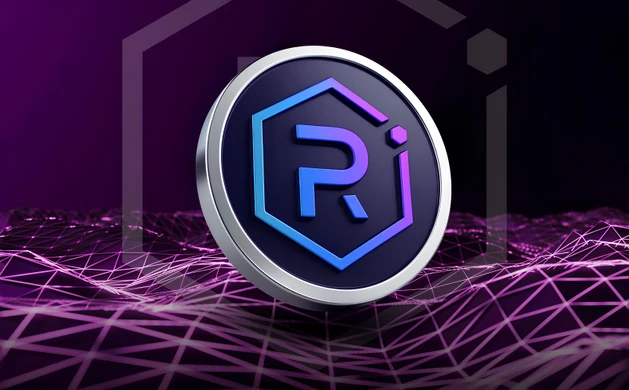
.webp)
%2520(1).webp)




